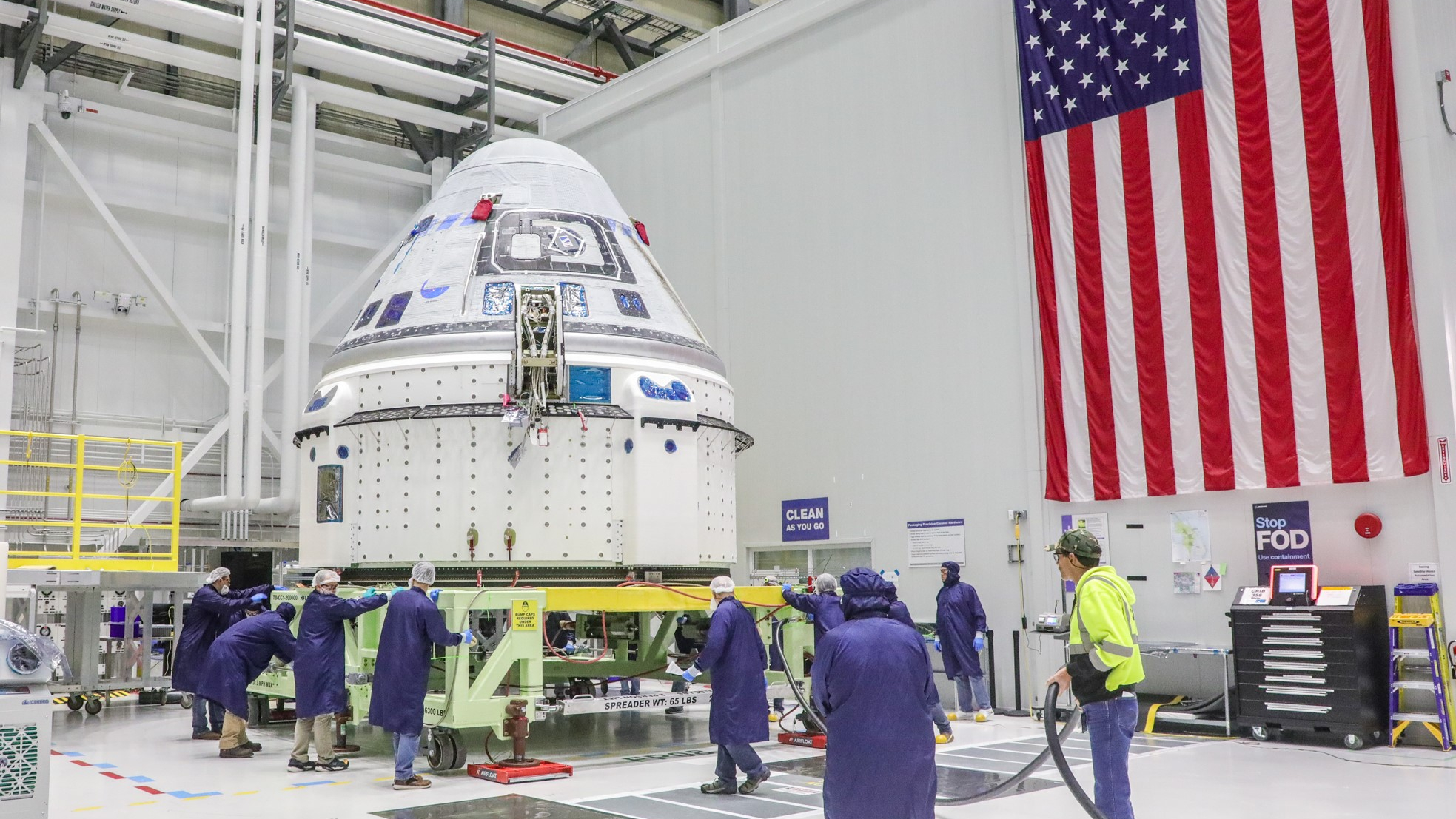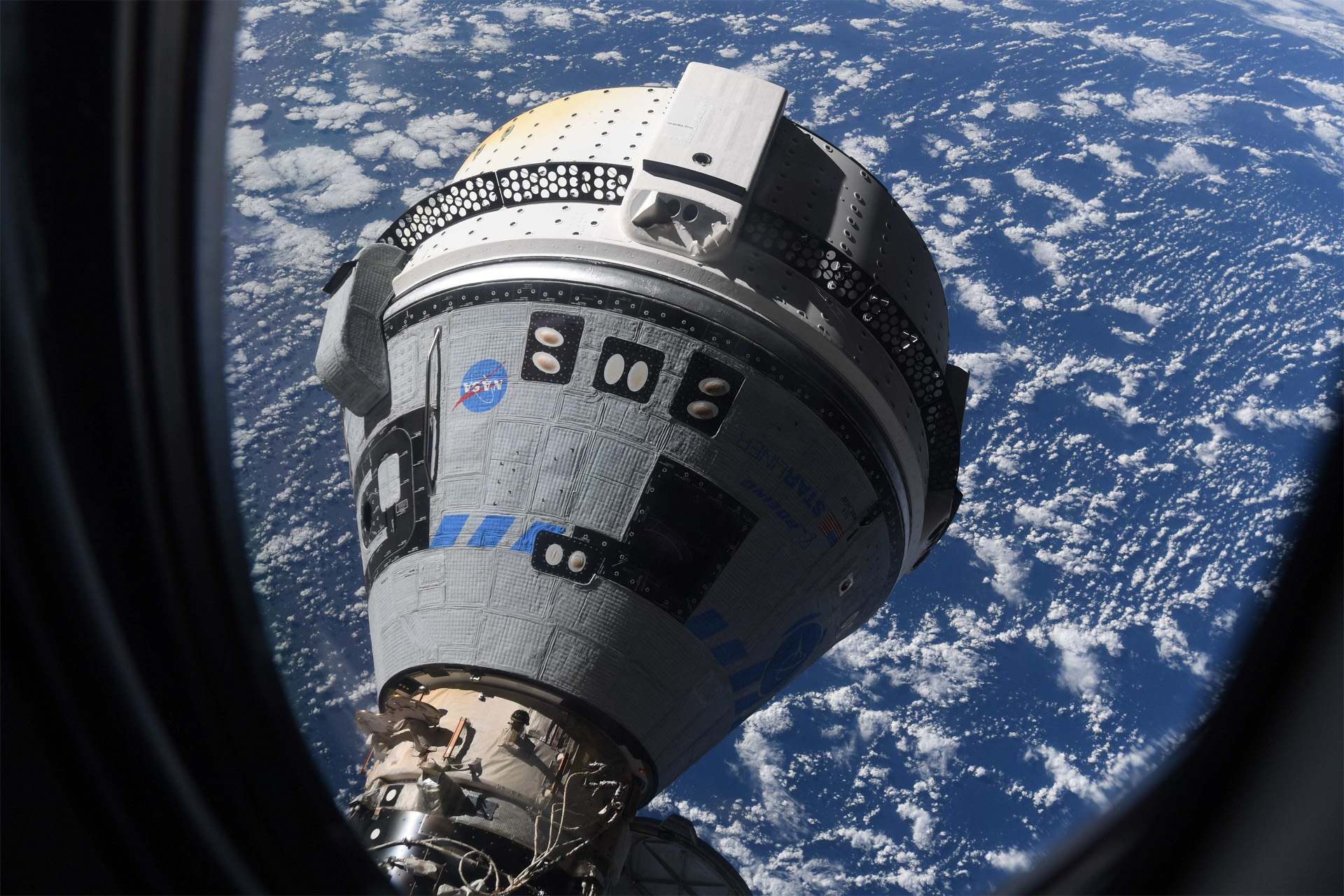
Boeing's new astronaut taxi for NASA won't carry people this year after all.
The company had been targeting July 21 for the first-ever crewed launch of its Starliner capsule on a mission, known as Crew Flight Test (CFT), that will send NASA astronauts Butch Wilmore and Suni Williams on a shakeout cruise to and from the International Space Station (ISS).
In early June, however, Boeing and NASA announced that CFT's liftoff had been delayed indefinitely due to newly discovered issues with Starliner's parachute system and its wiring. The company said those problems could potentially be resolved in time for a launch this fall, but that's not going to happen, Boeing and NASA officials said today (Aug. 7).
"Based on the current plans, we're anticipating that we're going to be ready with the spacecraft in early March," Mark Nappi, Boeing's Starliner vice president and program manager, said during a press conference today.
And that's just an anticipated spacecraft readiness date, he stressed; a target launch date has not yet been set.
Related: Starliner: Boeing's next-generation spaceship for astronauts
In September 2014, NASA selected Boeing and SpaceX to ferry agency astronauts to and from the ISS, awarding both companies multibillion-dollar contracts. SpaceX is fully up and running — it's scheduled to launch its seventh operational crewed flight to the orbiting lab on Aug. 25 — but Starliner has just two uncrewed test missions under its belt to date.
Get the Space.com Newsletter
Breaking space news, the latest updates on rocket launches, skywatching events and more!
The first of those, known as Orbital Flight Test (OFT), suffered a number of problems shortly after lifting off in December 2019 and failed to meet up with the ISS as planned. The follow-up, May 2022's uncrewed OFT-2, had better luck, successfully docking with the orbiting lab and returning safely to Earth.
Starliner's next big leap, CFT, has been pushed back repeatedly — from December 2022 to February 2023, for example, then to March, then to April, and then to July.
This latest slip results from two potential safety issues: Boeing engineers found that the "soft links" used on the suspension lines of Starliner's three main parachutes are not quite as robust as previously thought, and the company determined that the protective tape it used to wrap the capsule's many wires is flammable.
Boeing is taking the tape off in places where it's easy and safe to do so and considering other remediation techniques, such as protective barriers or coatings over it, in trickier spots, Nappi said.
The parachute work is multifaceted as well. For example, Boeing has modified the soft link design to make it stronger, and the new version is being manufactured now, Nappi said. The company also decided to swap out Starliner's parachute system, putting a new version slated for the first operational mission on board for CFT.
The new soft links will be incorporated into the new chutes, which will get to strut their stuff during a drop test soon.
"We expect that the drop test will occur in mid to late November," Nappi said. "That's what the planning indicates at this point, and we'll watch that closely."

Boeing is on pace to finish the required work by early March, Nappi said. But there are other boxes to check as well before Starliner — and Wilmore and Williams — can take to the skies atop a United Launch Alliance (ULA) Atlas V rocket.
"We're now working with NASA's Commercial Crew Program, ISS and ULA on potential launch dates based on our readiness," Nappi said. "It's a complicated manifest on ISS, as you all know, and the launch pad of ULA. So, we'll work that throughout the next several weeks and see where we can get fit in, and then we'll set a launch date."
Despite the delays, the company remains committed to Starliner and fulfilling its contractual obligations to NASA (at least seven crewed flights to the ISS, including CFT), Nappi added.
"We're very excited about it," he said. "This is a pretty exciting business."
Join our Space Forums to keep talking space on the latest missions, night sky and more! And if you have a news tip, correction or comment, let us know at: community@space.com.

Michael Wall is a Senior Space Writer with Space.com and joined the team in 2010. He primarily covers exoplanets, spaceflight and military space, but has been known to dabble in the space art beat. His book about the search for alien life, "Out There," was published on Nov. 13, 2018. Before becoming a science writer, Michael worked as a herpetologist and wildlife biologist. He has a Ph.D. in evolutionary biology from the University of Sydney, Australia, a bachelor's degree from the University of Arizona, and a graduate certificate in science writing from the University of California, Santa Cruz. To find out what his latest project is, you can follow Michael on Twitter.
-
Classical Motion It's disappointing on several levels. It appears the basic design was flawed. This too is disappointing on several levels. And we can go deeper.Reply
A lot of high tech design aids were suppose to prevent this. Another disappointment. -
billslugg A case study could be made about Boeing failures. Do a problem analysis and at the root cause will most likely be poorly defined ethical standards. See: 737 Max investigation. Boeing cheats in order to make $$. Who woulda' thunk.Reply
Boeing cheats to make more money. They spend their time on rework and lawsuits.
Musk doesn't need to cheat since he already has money. He spends his time watching liftoffs. -
newtons_laws Boeing used to be highly regarded, with a history of very successful aerospace developments e.g the Boeing 707 (one of the first jet airliners) and the 747 jumbo jet, and building the Saturn V first stage and the overall integration of the Saturn V. In recent years their former engineering excellence seems to have been sidelined by the new management, resulting in the egregious 737 Max crashes, several problems with the 787 Dreamliner and now the endless delays to the Starliner capsule. You ignore sound engineering at your peril (or rather the peril lies on those who are the passengers in the aircraft or spacecraft!). The one consolation is that the Starliner is a fixed price contract (although they were awarded a far higher price than SpaceX got for its crewed Dragon), so the cost overruns will be at Boeing's expense.....Reply -
Classical Motion Well, that's one good thing to hear about it. I'll take one of those disappointments back.Reply -
Unclear Engineer It looks like Boeing is just going through the motions at this point. They have been rendered unimportant by SpaceX's success with its reusable launch vehicles and Dragon crew capsules, and they aren't going to make more profits on cost overruns on a fixed price government contract.Reply
That is really disappointing, because their capsule design really does not do anything that has not already been done before. They just failed to produce a reliable product on a relevant time frame. And, they need a launch vehicle that is not yet available, mainly because they are not making that. Compared to SpaceX making both the launch vehicle and a capsule that works, with both being reusable, Boeing is looking like it can't even do what it used to do, much less something really new.
I would like to see some other companies become major players in successful new major ventures, in addition to SpaceX. Maybe Blue Origin? Reliability comes from diversity plus redundancy, and I want to see the U.S. space capabilities be highly reliable for getting a goal accomplished on a specified schedule. Relying on government funding is not a reliable means of support - it waxes and wanes on the national and international politics.
Right now, we have a large number of small commercial companies trying to get into profitable space commerce. I expect there are too many competitors for all to be commercially successful, so I expect some shakeout. I just hope the companies that are left give us a robust capability, in case something happens to SpaceX.









